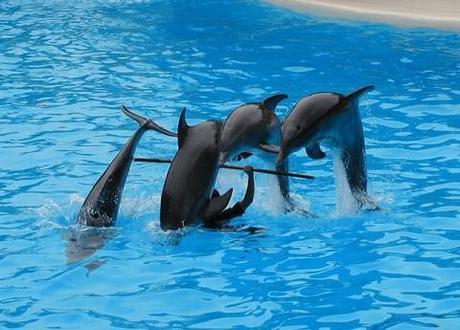
Some dolphins, queuing up to vote. Photo credit: Nico Kaiser http://www.flickr.com/photos/nicokaiser/40857877/sizes/z/in/photostream/
Could dolphins and whales – known under the name “cetaceans” – soon have the right to vote? Well, perhaps not quite yet – just think how wet the voting ballots would get – but scientists have put forward the idea that they are philosophically and ethically creatures that can be defined in terms of personhood.
At the American Association for the Advancement of Science, in Vancouver, Canada, scientists brought together years of research which demonstrates that dolphins and whales have complex brains and a level of self-awareness that is essentially the same as a human. Experts have agreed that in this way dolphins and whales are “people” in a philosophical sense. They recognize themselves in mirrors, for instance, and exhibit many signs of highly intelligent behavior. So they now have their own declaration of Rights. Loria Marino, one of the four scientists responsible, said “Their basic needs are very much like humans — to be able to stay alive, to not be confined, to make choices and travel, and perhaps foremost to engage in social interaction.”
Commentators largely see it as a toss up between the advancement of society in general, or as a morally contradictory stance. Are animals the same as humans? How can they have rights? And what about the rights of, say, unborn children? The debate continues…
What would it mean? Should their rights be recognised, it would mean no more whaling, and no more dolphin and whale shows in zoos. It would also mean that oil drilling companies would have to do serious research into how their activities affected our sea-faring friends; conservation groups would also have to reconsider how many in a pod can be allowed to die without making a significant impact. Previously it was thought that about 500 out of a 10,000 big group could go; now it seems that that represents quite a lot of distinctive culture.
“We’re saying the science has shown that individuality – consciousness, self-awareness – is no longer a unique human property. That poses all kinds of challenges,” said Prof Tom White, author of In Defence of Dolphins, quoted on the BBC.
Just how clever are they? The BBC gave a run down of some particularly intelligent cetacean behavior. Orcas in Patagonia kept alive an eldery whale with a damaged jaw; dolphins had to press one of two levers to tell the difference between two sounds; but there was a third lever which they had to press if they thought the test too difficult. The dolphins behaved as humans would. In Iceland, orcas and killer whales are known to work in tandem – th whales show the fishermen where to lay their nets, and then are allowed some of the catch.
Pretty damn clever. Tom Whipple on The Times said some of it all came down to a particular dolphin called Kelly, in Mississipi, who was trained to get rid of litter from her pool; she’d get a reward every time she removed a bit. But she used to hide litter, and whenever she was hungry she’d tear a bit off and give it to her trainer.
Guys, are you sure? That may be so, but a spokesman for the Roman Catholic Archdiocese of Vancouver said that he wasn’t at all sure: ““I sometimes wonder whether we’ve got our priorities mixed up when we treat animals and the environment with more respect than human beings. There are billions of people around the world who deserve our attention,” quoted on The National Post.
Dolphins aren’t people! Exactly, expostulated Jonathan Black on his Apostolic Theology Blog. Hesaid that he wasn’t arguing for the “killing of dolphins”, but that “Dolphins are not people. There is a very big difference between the killing of a dolphin and the killing of a human being.” We can see this from the Bible, as in the book of Genesis, which says that humans have something special about them – “because humans are made in God’s image.” And how can you “accord human rights to dolphins while denying human rights to unborn children?” A society in which we can’t kill dolphins because of their personhood, but in which we can abort foetuses, is obviously wrong. “How could it be so morally abhorrent to kill a dolphin, but morally neutral to abort an unborn child?”
More civilised society? You can bandy about religious arguments all you want. But The Guardian ran a series of humourous Pass Notes on the whales, which, reading between the lines, are very favourable towards cetacean rights. So if we “ascribe the rights to life, liberty and the pursuit of happiness to the cast of Towie”, who can’t do anything “without warning and intensive verbal coaching”, we should “extend our protection to the big fish that outpace them too.” Well, aside from the fact that they’re not fish, maybe it’s “a sign of an increasingly civilised society.” Great apes have rights in the Balearics and New Zealand. “Do say: What a brilliant spoke in the wheels of whaling nations and entertainment zoos such a bill would be! Sign me up! Don’t say: Bring me a non-dolphin friendly tuna sandwich on panda bread and a disposable plastic plate. It’s political correctness gone mad!”

